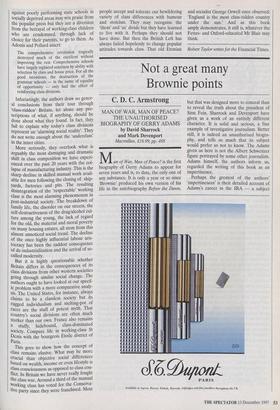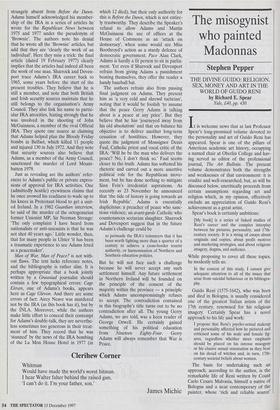Not a great many Brownie points
C. D. C. Armstrong
MAN OF WAR, MAN OF PEACE? THE UNAUTHORISED BIOGRAPHY OF GERRY ADAMS by David Sharrock and Mark Devenport Macmillan, i16.99, pp. 488 Man of War, Man of Peace? is the first biography of Gerry Adams to appear for seven years and is, to date, the only one of any substance. It is only a year or so since 'Brownie' produced his own version of his life in the autobiography Before the Dawn, but that was designed more to conceal than to reveal the truth about the president of Sinn Fein. Sharrock and Devenport have given us a work of an entirely different character. It is solid and serious, a fine example of investigative journalism. Better still, it is indeed an unauthorised biogra- phy, and tells us much that its subject would prefer us not to know. The Adams given us here is not the Albert Schweitzer figure portrayed by some other journalists. Adams himself, the authors inform us, regarded the writing of this book as an impertinence.
Perhaps the greatest of the authors' 'impertinences' is their detailed account of Adams's career in the IRA — a subject strangely absent from Before the Dawn. Adams himself acknowledged his member- ship of the IRA in a series of articles he wrote for the Republican News between 1975 and 1977 under the pseudonym of 'Brownie'. The authors note his denial that he wrote all the 'Brownie' articles, but add that they are 'clearly the work of an individual'. Here they miss a trick: the final article (dated 19 February 1977) clearly implies that the articles had indeed all been the work of one man. Sharrock and Deven- port trace Adams's IRA career back to 1965, some years before the start of the present troubles. They believe that he is still a member, and note that both British and Irish security sources maintain that he still belongs to the organisation's Army Council. They also link his name to partic- ular IRA atrocities, hinting strongly that he was involved in the shooting of John McGuinness, a member of the rival Official IRA. They quote one source as claiming that Adams helped plan the Bloody Friday bombs in Belfast, which killed 11 people and injured 130 in July 1972. And they note that security sources also believe that Adams, as a member of the Army Council, sanctioned the murder of Lord Mount- batten 1979.
Just as revealing are the authors' refer- ences to Adams's public or private expres- sions of approval for IRA activities. One (admittedly hostile) eyewitness claims that he once avowed his readiness to wade up to his knees in Protestant blood to get a unit- ed Ireland. In a 1982 Guardian interview, he said of the murder of the octogenarian former Unionist MP, Sir Norman Stronge: 'The only complaint I have heard from nationalists or anti-unionists is that he was not shot 40 years ago.' Little wonder, then, that for many people in Ulster 'it has been a traumatic experience to see Adams feted as a peacemaker'.
Man of War, Man of Peace? is not with- out flaws. The text lacks reference notes, and the bibliography is rather slim. It is perhaps appropriate that a book jointly written by a Grauniad journalist should contain a few typographical errors: Cage Eleven, one of Adams's books, appears here as Cage Glevon. And there are some errors of fact: Airey Neave was murdered not by the IRA (as this book has it), but by the INLA. Moreover, while the authors make little effort to conceal their contempt for Adams's double-talk, they are neverthe- less sometimes too generous in their treat- ment of him. They record that he was 'stunned' by the news of the IRA bombing of the La Mon House Hotel in 1977 (in which 12 died), but their only authority for this is Before the Dawn, which is not entire- ly trustworthy. They describe the Speaker's refusal to allow Adams and Martin McGuinness the use of offices at the House of Commons as an 'attack on democracy', when some would see Miss Boothroyd's action as a sturdy defence of democratic government. Pace Alan Clark, Adams is hardly a fit person to sit in parlia- ment. Yet even if Sharrock and Devenport refrain from giving Adams a punishment beating themselves, they offer the reader a handy baseball bat.
The authors refrain also from passing final judgment on Adams. They present him as 'a very cold and shrewd tactician', noting that it would be foolish 'to assume that the peace Gerry Adams is talking about is a peace at any price'. But they believe that he has 'journeyed away from his old absolutism' and that on balance his objective is to deliver another long-term cessation of hostilities. However, they quote the judgment of Monsignor Denis Faul, Catholic priest and vocal critic of the IRA: 'Will he be the man who delivers the peace? No, I don't think so.' Faul seems closer to the truth. Adams has softened his rhetoric and carved out a more assertive political role for the Republican move- ment, but he has done nothing to mitigate Sinn Fein's irredentist aspirations. As recently as 23 November he announced that 'the tide of history is going towards an Irish Republic'. Adams is essentially duplicitous: a preacher of peace who sanc- tions violence; an avant-garde Catholic who countenances sectarian slaughter. Sharrock and Devenport suggest that in the future Adams's challenge could be
to persuade the IRA's volunteers that it has been worth fighting more than a quarter of a century to achieve a cross-border tourist authority, or harmonisation of Northern and Southern education policies.
But he will not face such a challenge because he will never accept any such settlement himself. Any future settlement in Northern Ireland will be founded on the principle of the consent of the majority within the province — a principle which Adams uncompromisingly refuses to accept. The contradiction contained in this biography's title turns out to be no contradiction after all. The young Gerry Adams, we are told, was a keen reader of George Orwell. He certainly gained something of his political education from Nineteen Eighty-Four. Gerry Adams will always remember that War is Peace.



















































































 Previous page
Previous page